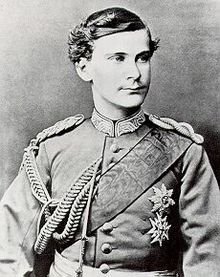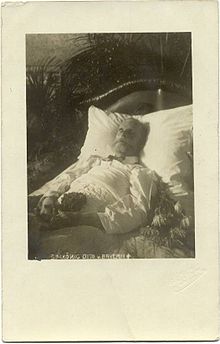- Otto of Bavaria
-
Otto King of Bavaria 
Reign 13 June 1886 - 5 November 1913 Predecessor Ludwig II Successor Ludwig III House House of Wittelsbach Father Maximilian II of Bavaria Mother Marie of Prussia Born 27 April 1848
The Residenz, MunichDied 11 October 1916 (aged 68)
Schloss FürstenriedOtto (German: Otto Wilhelm Luitpold Adalbert Waldemar von Wittelsbach; 27 April 1848 – 11 October 1916), was King of Bavaria from 1886 to 1913. He was the son of Maximilian II and his wife, Marie of Prussia, and younger brother of Ludwig II. Otto of Bavaria is not to be confused with Otto of Greece, who was his uncle and godfather.
Biography
Prince Otto served in the Bavarian army from 1863. When King Wilhelm I of Prussia was proclaimed German Emperor on 18 January 1871 at the Palace of Versailles, Prince Otto represented his brother who refused to participate. Otto then criticized the celebration as ostentatious and heartless in a letter to Ludwig.
It is claimed Otto suffered from severe mental illness. He was declared insane in 1875. The cause of his illness has not been revealed. He was kept confined in Fürstenried Palace under medical supervision from 1875 until his death.
Otto became King of Bavaria upon his older brother's deposition and unexplained death in 1886. However, Otto never truly ruled as King and was by some accounts not even aware that he had become King. Otto's uncle, Prince Luitpold, served as Prince Regent for Otto until Luitpold's death. Luitpold's son Ludwig then became the next Prince Regent.
The constitution of Bavaria was amended on 4 November 1913, to include a clause specifying that if a regency for reasons of incapacity lasted for ten years with no expectation that the King would ever be able to reign, the Regent could proclaim the end of the regency and assume the crown himself.
The following day, Otto was deposed by his cousin, Prince Regent Ludwig, who then assumed the title Ludwig III. The parliament assented on 6 November, and Ludwig III took the constitutional oath on 8 November. Otto was permitted to retain his title and honours until his death in 1916. In this time Bavaria had "two kings".
Otto's remains were interred in the crypt of the Michaelskirche in Munich. Bavarian tradition called for the heart of the king to be placed in a silver urn and sent to the Gnadenkapelle (Chapel of the Miraculous Image) in Altötting, beside those of his brother, father and grandfather.
External links
Ancestry
Maximilian I Joseph of Bavaria Ludwig I of Bavaria Augusta Wilhelmine of Hesse-Darmstadt Maximilian II of Bavaria Frederick, Duke of Saxe-Altenburg Therese of Saxe-Hildburghausen Duchess Charlotte Georgine of Mecklenburg-Strelitz Otto of Bavaria Frederick William II of Prussia Wilhelm of Prussia Frederika Louisa of Hesse-Darmstadt Marie of Prussia Frederick V, Landgrave of Hesse-Homburg Landgravine Marie Anna of Hesse-Homburg Caroline of Hesse-Darmstadt Otto of BavariaBorn: 27 April 1848 Died: 11 October 1916Regnal titles Preceded by
Ludwig II
King of Bavaria
13 June 1886 – 5 November 1913Succeeded by
Ludwig IIIThe generations are numbered from the ascension of Maximilian I Joseph as King of Bavaria in 1806. 1st generation 2nd generation 3rd generation Ludwig II · Otto · Ludwig III · Prince Leopold · Prince Arnulf · Prince Ludwig Ferdinand · Prince Alfons4th generation Rupprecht, Crown Prince of Bavaria · Prince Karl · Prince Franz · Prince Georg · Prince Konrad · Prince Heinrich · Prince Wolfgang · Prince Ferdinand · Prince Adalbert · Prince Joseph5th generation Prince Luitpold · Albrecht, Duke of Bavaria · Prince Rudolf · Prince Heinrich · Prince Ludwig · Prince Rasso · Prince Eugen · Prince Konstantin · Prince Alexander6th generation Franz, Duke of Bavaria · Prince Max, Duke in Bavaria · Prince Luitpold · Prince Franz-Josef · Prince Wolfgang · Prince Christoph · Prince Leopold · Prince Adalbert7th generation Prince Ludwig · Prince Heinrich · Prince Karl · Prince Tassilo · Prince Richard · Prince Philip · Prince Corbinian · Prince Stanislaus · Prince Marcello · Prince Manuel · Prince Konstantin · Prince Hubertus8th generation Prince LeopoldMaximillian I Joseph (1805-1825) · Ludwig I (1825-1848) · Maximilian II (1848-1864) · Ludwig II (1864-1886) · Otto (1886-1913) · Ludwig III (1913-1918)Categories:- 1848 births
- 1916 deaths
- House of Wittelsbach
- Knights of the Golden Fleece
- People from Munich
- Kings of Bavaria
- Princes of Bavaria
- Grand Masters of the Order of Saint Hubert
- Grand Masters of the Royal Order of Saint George for the Defense of the Immaculate Conception
- Roman Catholic monarchs
Wikimedia Foundation. 2010.

